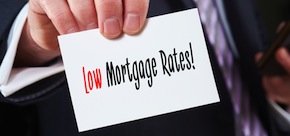If you’re still paying off a mortgage, the current buzz about low-fixed-rate loans may have you weighing your options. But could you lose by fixing your rate, or will you be laughing all the way to the bank?
Q. Kathy
Interest rates appear to be at an all-time low and some of the deals on fixed rates seem too good to pass up on. I am a 52-year-old pre-retiree and have about five years left on my mortgage. Should I lock in interest rates on my loan as a way of future-proofing myself?
A. Interest rates have definitely fallen. Although they may be at an all-time low, many were asking the same question four years ago, and yet interest rates have continued to fall. The question on most people’s minds is whether they should be fixing their variable interest rate to protect themselves from rising interest rates.
To fix or not to fix will depend on your own personal circumstances. There is no right or wrong answer. Mortgage industry research over the past 30 years has revealed that borrowers on a variable rate are 83 per cent better off than borrowers on a fixed rate.
There are many reasons why you would fix your mortgage rate; however, speculation is not one of them. This has always been my view. Nevertheless, it can be a sound strategy depending on your own circumstances (e.g. investment loans).
Below are the main pros and cons of fixing an interest rate, which will hopefully help you with your thinking.
Pros:
- fixed repayments
- known cash flow
- certainty around household expenses
- easier to budget
- lower repayments and lower interest costs if interest rates rise
- you buy yourself an insurance policy against rate rises.
Cons:
- no flexibility as you have limited ability to transact on your loan account, potentially costing you thousands in extra interest
- limited extra repayments (usually $10,000 max per annum)
- no redraw until the fixed term is over
- potentially high exit cost if you want to break the fixed term (e.g. you sell your property sooner than planned)
- higher repayments and higher interest costs if rates fall further (unlikely given the above comments).
A key consideration is the flexibility issue and the fact that variable rates are still at an all-time low. If you were to fix your rate now you would be paying around 4.9 per cent from day one, compared to around 5.1 per cent for a discounted variable rate.
If you prefer to fix your interest rate, then I would suggest you determine what your estimated loan amount will be in three years’ time. Also, do not fix any more than this amount so that you retain some flexibility to repay more than the standard loan repayments.
I hope the above gives you some food for thought.
Maurice Patane has been a financial planner for over 25 years. His experience has shown him that many Australians are not living the lives of which they dream, which is often due to poor financial decisions. Maurice is dedicated to helping everyday Australians take control of their financial future, so that they no longer have to worry about money.
If you have a question or Maurice, please email Finance@yourlifechoices.com.au

